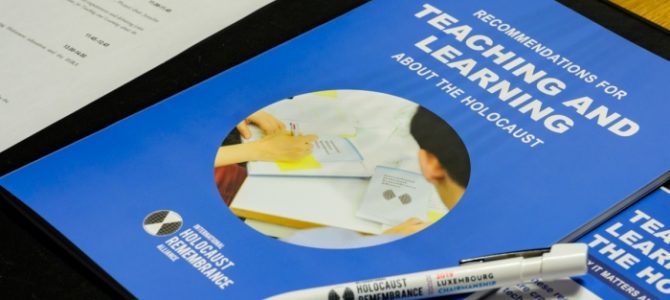Photo: The IHRA Recommendations for Teaching and Learning about the Holocaust were adopted in 2019 and are now available in eight languages. Credit: Charles Caratini.
Holocaust education helps create a strong foundation for democratic societies and for combating hateful ideologies. One year after the adoption of the Recommendations for Teaching and Learning about the Holocaust, this resource has proven valuable to educators and policymakers across the globe.
The Importance of Holocaust Education
Holocaust education has always been central to the IHRA’s mandate. Both the 2000 Stockholm Declaration and the 2020 IHRA Ministerial Declaration underline the responsibility to promote Holocaust education. After all, it is an important part of “counter[ing] the influence of historical distortion, hate speech and incitement to violence and hatred.” That is, Holocaust education remains fundamental to the preservation of democratic values and pluralistic societies.
This is because learning about the Holocaust gives us a chance to reflect upon important moral, political and social questions. Understanding some of the mechanisms that lead to genocide helps to foster qualities necessary for the development of civic-minded citizens such as critical thinking and societal awareness. It also helps preserve the memory of the victims and survivors of the Holocaust.
Successful Year Implementing Activities
The Teaching Recommendations were devised by education experts to help policymakers, practitioners and educators both in the school classroom and in professional training settings. With their adoption at Luxembourg City last year, member-states pledged to translate, disseminate and promote the Recommendations throughout their respective national contexts.
IHRA member-states and permanent international partners continued dissemination efforts despite hurdles presented by the COVID-19 pandemic. The Teaching Recommendations were promoted at over 88 events in 22 countries this year. This translates to over 3,500 participants who were made aware of this resource, 115 of them policymakers. At least 11 countries are planning further promotion efforts into 2021.
As of today, there are also eight languages versions of the Recommendations available on the IHRA website–Bulgarian, Croatian, English, Estonian, German, Macedonian, Norwegian and Polish–with fourteen more languages in progress. At the Leipzig Plenary concluded last week IHRA chair ambassador Michaela Küchler commended the countries involved for their efforts which also included coordinating translations among member-states who share the same language.
An outreach project now underway will look at the use of the Teaching Recommendations in three case-study countries: Croatia, Hungary, and the United Kingdom.
At the Leipzig Plenary the Education Working Group in coordination with the Permanent Office was tasked with the responsibility of ensuring their continued and widespread use. This is a promising development because the need for Holocaust education is greater than ever.
Full text here.


